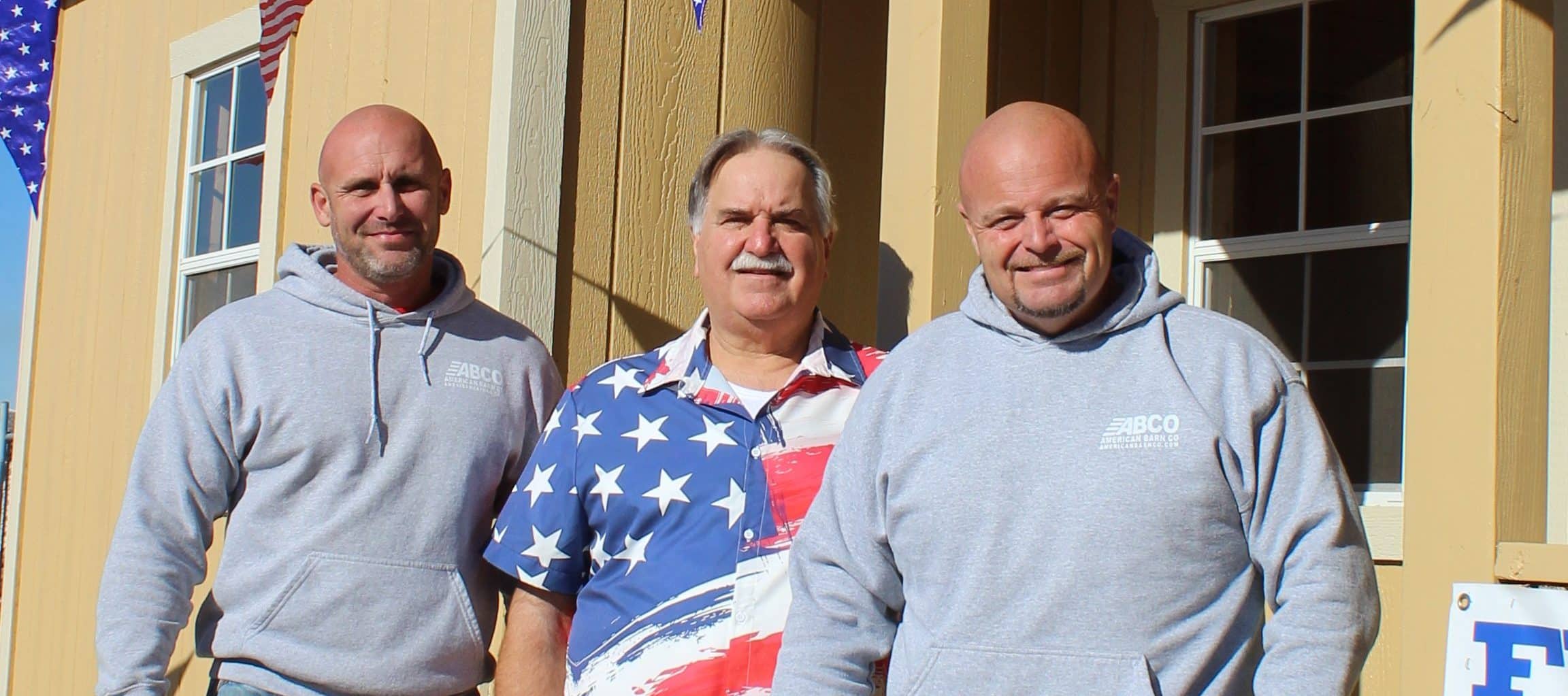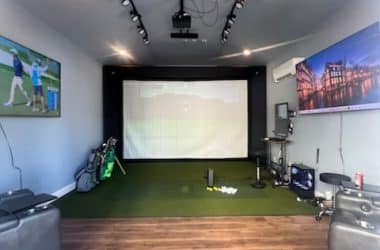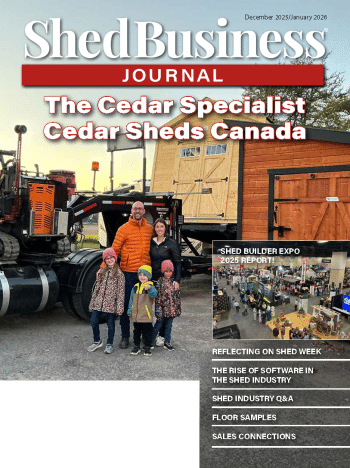
The American Southwest may seem like a vast desert area, and it is.
However, there are still plenty of people living out there, and like many Americans these days, they want sheds.
American Barn Co. LLC (ABCO), headquartered in Murray, Kentucky, has made a name for itself serving the people in the Southwest by treating its people right.
Shed Business Journal spent some time with founder and co-owner Jesse Maupin on the ABCO lot in Las Cruces, New Mexico, to learn more about his story and the company’s operations.
To start off, tell us how you got into shed building.
I was an operations manager for an automotive supplier for the Big Three, for an OEM sunroof supplier for five years. They closed and went back to Michigan from Murray, Kentucky. I was looking for another job, and I have some family that works for one of the big portable building companies. I had known the owner of the company, and I ended up meeting with him to discuss possibilities in the Southwest. That was in the very first part of 2010.
I started with a brand-new portable building company in February of 2010. I started with them in New Mexico and West Texas, then into Southern Colorado and Arizona. I was with that company until June 1, 2022. That’s when American Barn Co. LLC was born.
I feel that these big barn companies have gotten complacent being the big guys on campus, with the mentality their network needs the company rather than the company needs its network. If you don’t put value on your people and your network, there is something better out there and they will eventually find it.
Today you need to put emphasis not on just people’s pay but that they are genuinely valued and appreciated. Pay needs to be competitive, but recognition and just being good to people will go a long way in the right direction, also.
I have opened over five manufacturing plants, recruited numerous barn haulers, and set up dozens and dozens of dealers, and the one thing that all of them have responded well to was being honest with them, appreciating them, and being willing to roll your sleeves up and work right beside them to get the job done.
I have never asked anyone in my group to do something that I would not stand beside them and do together. I’ve seen young builders and drivers start aggressively, driven, and then fast forward 10 years and they’re still almost making the same money. And companies wonder why they can’t keep people? If you’re paying competitively and treating them even better, then that is a recipe for success.
Your headquarters are in Kentucky, but you sell sheds in the Southwest. How does that work?
I started in the Southwest. The region was an unknown to the portable building industry then, and since then, it’s just been where I do my thing. My knowledge of the Southwest and the relationship that I have with the people out there and at the corporate office makes it work.
There is a lot of trust in running a business from thousands of miles away; however, if you surround yourself with good like-minded people it will work.
My team and I travel a lot and put emphasis on spending quality time with our network. You have to continuously work on bettering your relationship and being “boots on the ground” with your network and having their backs, regardless of how far the corporate office is or what time it is when we are back home.
What are your customers looking for in the structures they buy from you?
It varies because of the dynamics of the Southwest. You can be from low desert to 8,000 feet in elevation in a matter of hours. Your customer base can vary just as much as the terrain.
We want to offer the most structurally sound portable building in the business, using far superior materials than the competition. We will not compromise quality for cost. If we have to spend more money to make a better building, then that is what we do. We are not the cheapest portable building in the Southwest, but I don’t know of many people who bought the best and then said I wish I would have bought the cheaper one.
When customers show up, they start seeing what you have, and then creative wheels start spinning. Like the greenhouses. The greenhouses have gone over big because out here there’s no shade, but the wind constantly blows. So, if they try having a garden, the wind will blow it over. But what the customers show up for, when they see the variety and what the options that we can do, a lot of times it’ll change.
We’ve always told customers, “If you think you need a 10 by 16, you really need a 10 by 20.” Because once they start putting their stuff in it and then the family starts putting their stuff in it, their big building is now a little building and it’s full.
When we tell the customers we are building the best building in the Southwest we mean it. We do solid comparisons against the competition, and we encourage customers to shop around. They will be back if they know what quality and real value is.
As far as material usage, the complexity of the structure, the engineering, we can back that up.
Every floor joist that we do—whether it’s 6 wide, 8 wide, 10 wide, 12 wide—it’s 2 by 6. It’s 2 by 6 trusses on everything; 2 by 6 loft joists on everything. There’s not a single ounce of OSB in our buildings. Half-inch four-ply plywood decking. Half-inch four-ply plywood in the lofts. Half-inch Duratemp plywood backed siding. When you talk about material usage and quality, there’s nobody out here who’s building a better building than us. Period.
In the cities, they’ve got concrete walls, stone walls, so that’s something that we’re having to adapt to, and we also have crane options, but a lot of these older areas have got so many overhead power lines, you can’t even crane into it. We’re getting dealer feedback that the customers want build-on-site so we’re rolling out our build-on-site crews.
Build-on-site is going to be available in all areas. Right now, out of the Las Vegas shop, we have a dedicated crew that’s doing northern New Mexico all the way up to Southern Colorado where we’ve got sales lots. They’ve got their banners up for build on site.
I have four different contractor’s licenses, and we’re legal in Utah, New Mexico, Arizona, and Colorado. So, when we have to do a build-on-site, we’re legal to get it done.
As far as I know, we are the only shed manufacturer in the state of New Mexico that’s modular inspected. If you are going to go after it, you need to be legal and compliant with the states you operate in, or it will cause issues down the road.
We promote carports. We feel it accentuates the business. They may not want a portable building, but the guy that’s got an RV, a golf cart or a side-by-side, and he’s not going to lock it up. So, he’ll buy a carport. Shade is the key when you don’t have trees.
How are you marketing your structures?
We’ve got a big ad campaign. We spend a fair amount of money on advertising. Something that we’ve been really focusing on is the online platform. A lot of it is Facebook. Facebook, TikTok, Instagram, a lot of the platforms that were unheard of years ago, that’s what we’re doing.
It’s the online platform and just getting it out there. Having manned sales lots with a good variety of clean, fresh, innovative looking-buildings and lots that look like we sell buildings. We’re in the barn business. That’s what we do.
How are you using TikTok and Instagram for your marketing?
Basically, doing short videos of the sales lots. Walk throughs of the buildings. Adding some good music to it. We are trying to educate the customers about our buildings and have some fun with it. Just getting it to where it’s informative, appealing to people. “Man, That’s cool!” Click, click, click.
It’s just getting the brand out there. Getting brand awareness out there. “I didn’t know you could do that” or “I didn’t know you could add all those windows.” Just showing the possibilities, exploring the possibilities.
Are you building structures and putting them on your lots, or are you building custom orders?
Half areon-lot sales, and half are new custom order sales. People will buy what they can get quickly lots of times, so if you stock specific items, you’re more than likely going to sell specific items. So, we get pretty creative on stocking what we sell.
Now, if you want to order it, we can go that route, also. We try to promote options and customization to make the building just exactly how you want it.
There is nothing more upsetting to a customer when a dealer has to tell a customer that you can’t do an option. The customer is thinking you can’t do the option that I asked for, but you can build the building? It’s a wooden structure and we are going to make it happen. That’s what ABCO does. We build barns.
What kind of options do you have for customization?
Any kind of add-on option you can think of. We’re doing interior walls, insulated floors, and basically anything that the customer wants, and it doesn’t exceed what we can do legally by the state we are doing it.
The two-tone paint that we started doing has really been big. It gives it the “that looks like a house” type appeal, but we’re not building houses. We’re strictly rough construction and don’t wander off in the weeds with finishing them out. We do have several people in our network who are buying their buildings from us and they’re doing the tiny home thing because it’s big.
What do you think is coming next in storage buildings?
You’re going to see some stucco stuff out here, everything is stucco, Pueblo-style stuff. But the ones that we built, you can’t move them without a refinish crew. You’re going to have to factor in the expense of going out and fixing that when it gets to the customer. Some of the things that are coming I won’t discuss. We will just roll them out and let the rest of the companies follow.
Speaking of deliveries, tell us how you handle those in the Southwest.
All of our drivers are independent contractors. What we have found, and we’ve been through this, your drivers that you pay as company drivers, they’re getting paid hourly, generally, and they don’t go the extra mile.
Your performance-driven guys can make good money out there burning and going and the sky’s the limit. But an hourly guy, they’ll deliver one shed a day because they can say, “We delivered one and we got paid 400 bucks for the day, or we can deliver three, and we got paid 400 bucks for the day.” If your drivers are not well compensated out west, they will not last long. They are earning their money, and without them, you don’t have a game.
I’ve delivered sheds, and you can pull off on gravel and run for 20 miles. Then, you hit the dirt, and you’ll run 40 miles of dirt to get back to these houses where they want their shed.
You’ve got places out here where you can stand up on top of a mesa and look around everywhere far as you can see and not see a light. The Navajo Nation, that’s the size of West Virginia.
If the independent drivers don’t deal with the customer well, you’ll hear feedback. A lot of times we even get feedback through our website. Or, they’ll get on the Facebook page, but if they don’t do a good job, you’ll be the first one to know.
I talk to lots of my customers, and I always let them know who and what these guys are and if they have an issue, make sure you note it on the happy sheet or let me know because I can help you and we’ll make sure it gets handled.
Any final thoughts to add?
Our take on this awesome portable building business is retention. Keeping your network happy and feeling appreciated and loved is critical. Your network is a precious resource. It is not easily replaced. I know that all too well.
It’s not a question of which one is more important. Builders, drivers, dealers, corporate staff, and customers—they are all an important spoke of a wheel, and it won’t roll properly without one of them.
Remember to be good to your people. You can’t do it on your own, and who would want to? What’s the fun in that?




